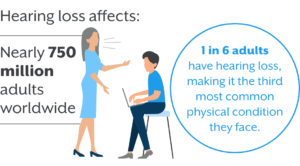The impact of deafness on the family is directly related to mental retardation. A range of emotions and reactions – grief, guilt, anger, are common


In nerve deafness, some defect in the sensory cells of the inner ear (e.g., their injury by excessive noise) or in the vestibulocochlear nerve prevents transmission of sound impulses from the inner ear to the auditory centre in the brain. Deafness at birth is nearly always of the nerve type and cannot be improved by medical means. Hearing loss can be inherited. Around 75-80% of all cases are inherited by recessive genes, 20-25% are inherited by dominant genes, 1-2% are inherited by X-linked patterns, and fewer than 1% are inherited by mitochondrial inheritance.


Syndromic cases occur with diseases such as Usher syndrome, Stickler, Waardenburg syndrome, Alport, and Neurofibromatosis type 2. These are diseases that have deafness as one of the symptoms or a common feature associated with it. The genetics that correspond with these various diseases are very complicated and are difficult to explain scientifically because the cause is unknown. In non syndromic cases where deafness is the only ‘symptom’ seen in the individual it is easier to pinpoint the physical genes.
Deafness is defined as a degree of impairment such that a person is unable to understand speech even in the presence of amplification (Elzouki, Abdelaziz Y.).In profound deafness, even the loudest sounds produced by an audiometer (an instrument used to measure hearing by producing pure tone sounds through a range of frequencies) may not be detected. In total deafness, no sounds at all, regardless of amplification or method of production, are heard.
Hearing loss exists when there is diminished sensitivity to the sounds normally heard. The terms hearing impairment or hard of hearing are usually reserved for people who have relative insensitivity to sound in the speech frequencies. The severity of a hearing loss is categorized according to the increase in volume above the usual level necessary before the listener can detect it.


What do I do when other people treat my child differently? How can I get other family members involved? How can I help hearing siblings adjust to a deaf or hard of hearing brother or sister? Parents with a child who has a hearing loss have many anxieties, concerns, and questions that are normal for concerned parents of any child. Some parents are able to adjust quickly to the demands presented by having a child who cannot hear. Other parents many never completely accept the fact that they have a deaf or hard of hearing child, but they learn to cope with child’s hearing loss in various ways.
A range of emotions and reactions – grief, guilt, anger, are common. Many parents find that these emotions return at each new stage of their child’s development, so that adjusting to deafness is a continuing process. Other parents may accept deafness at one point in life, only to find another area where acceptance has not yet been achieved. According to the World Health Organization (WHO) 2004, mental health is “a state of well-being in which the individual realizes his or her own abilities, can cope with the normal stress of life, can work productively and fruitfully, and is able to make a contribution to his or her community”.
Marien etal (2012) studied the factors related to mental health; these factors are; Physical/ Social and Environmental/ Psychological/ Family History. Anitha etal (2016) studied on 300 hearing impaired adolescents of both the gender, between the age range of 11 to 19 years to investigate anxiety, loneliness, adjustment, shame and depression with respect to marital status of parents.ADS (Anger disorder scale) was used to obtain the scores of anxiety, loneliness, adjustment, shame and depression. The results showed that anxiety in deaf has a significant relationship with marital status of parents.
Impact of Deafness on Mental Health and mental illness:
Hearing loss is directly related to mental retardation. Lots of studies are there, to verify the relationship between mental health and hearing loss. Packer (2015) studied hearing aids help out and reduce the strain of trying to understand the mumbles. New research shows that untreated hearing loss has a profound effect on mental state, affecting everything from temperament to perceived life satisfaction to cognition. Social isolation, depression and cognitive decline are all possible if hearing loss goes untreated. Ayonayon etal (2017) reported anxiety in older adults having hearing loss.
Depression, is a state of mood or emotional that is marked by feelings of low self-worth or guilt and a reduced ability to enjoy life. Written by: The Editors of Encyclopedias Britannica,(2018). Jillman Friedman (2008) studied the predictors of depressive symptoms in Persons with Deafness and Hearing Loss. Cognitive decline simply means that your brain doesn’t work as well as it used to. This isn’t the same as cognitive impairment, which can be the result of damage, disease or an increased level of cognitive decline from another source. Cognitive decline is a response to the aging of neurons and the decreased speed at which the brain functions.
Simonsick etal (2013) stated that cognitive decline is a significant problem that has been linked to untreated hearing loss in recent studies as well. Social isolation is defined as having little or no contact with other people. It usually lasts for extended periods of time. James (2014) studied among seniors, loneliness and social isolation are common problems which are unfortunately only exacerbated by hearing loss.
Major problem associated with the family:


The ability to communicate clearly with their child is the most important task parents will face and will have the greatest impact on developing an integrated family unit. Parent of deaf children frequently must deal with the negative reactions of others. Relatives as well as strangers often react as if the child were incapable of doing anything independently. It is normal for parents to feel angry and hurt when this happens.
You can develop strategies for coping with other people’s responses:
- You can confront people’s ignorance by discussing deafness and ways to communicate with your child.
- You can explain that pity is needless and only hurts the child.
- You can provide a positive, loving model for how to behave toward your child.
- In situations where you are frustrated, tired, or out in public, you can choose not to explain at all.
- Other parents who have coped with similar experiences have valuable insights to share about coping with these difficult situations.
Each family member will react differently to the diagnosis of hearing loss. Some members will learn to cope with the loss more easily than others. Problems existing in the family before the diagnosis may be magnified due to the additional stress associated with a child who has a disability in the family.
Additional responsibility always falls on parents Shoulder usually on the mother. In this process sometimes the female have to scarify her carrier for the well being of her child and family.Hearing brothers and sisters need as much information’s as adult family members do. They feel the stress in the family and may be expected to participate in activities that they might not understand or they would rather avoid. Whether younger or older, hearing siblings often feel jealous and resentful of the attention the deaf sibling receives. They may also feel embarrassed when they are playing with friends.
Parents need to strive to treat hearing and deaf siblings as normally as possible and not force the hearing children to participate in every activity related to the non-hearing child. By treating each child in your family as unique and special parent-time to each, you avoid singling out the deaf child as more important. This enhances positive self-concept in all siblings, reduces feelings of resentment, and encourages total family involvement. You can also encourage all siblings to help each other in certain situations. In this way the deaf child becomes both a receiver of help and a giver of help.


Vivek Kumar Jha
Associate Professor (Speech and Hearing)
Department of Audiology and Speech, Language Pathology
Faculty of Behavioural sciences
SGT University, Gurugram, Haryana
jhavivek98@yahoo.com
Mob:09560276840











